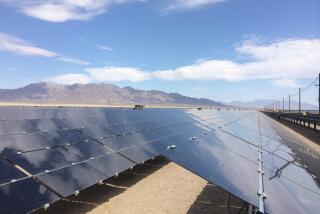China’s winds of change
- Share via
After President Nixon went to China, the United States urged that nation’s leaders to forget Marx and Mao and embrace the blessings of capitalism. Unfortunately, it’s been wryly said, they took our advice.
Americans have by now become inured to China peeling off layers of the U.S. manufacturing base. The Asian giant, though, has never been at the starting gate of a new industry that promised exceptional growth. That’s a natural place for America, we like to think. Indeed, the U.S. booted up the Internet business, fostering phenoms such as Cisco Systems and EBay. Those innovators brought the world online, enriching our national economy.
But with “clean tech” and renewable energy heralded as the next world-changing opportunity -- and our ticket out of the Great Recession -- the United States is at risk of ceding this strategic terrain.
U.S. setbacks dealt by the weakened economy have helped China’s prospects in green commerce. It’s become the capital of solar and wind power manufacturing, and it aims to be the main source of affordable electric cars. In the U.S., the lending freeze has combined with cheap oil to stunt the fortunes of clean energy. Wind, solar and biofuel projects have been canceled and seed capital is scarce, leaving fertile ideas on the drawing board.
While U.S. gross domestic product shrank 6.1% in the first quarter of this year, China’s expanded by the same proportion. Its banks are not only standing but healthy, even amid a global downturn that has curbed demand for Chinese exports. At the same time, Beijing has raised efficiency and sustainability goals, largely in a quest for energy security.
There’s an irony here, as those who have wheezed in Beijing’s foul air know. China has overtaken the U.S. as the top greenhouse gas emitter, the fallout of breakneck development and its role as workshop for the West’s cut-rate goods. Deforestation, overgrazing and poor water management are expanding its deserts; many of its rivers are flush with toxins. To environmentalists, China’s crimes against nature threaten the planet.
Yet even as it has alarmed green activists, China has also stirred their hopes. Although the U.S. unseated Germany last year as the world leader in generating wind energy, this year, China is expected to be first in building the industry’s machinery, largely for foreign firms. It’s also installing wind turbines at a fast pace to generate clean electric power. The top two firms in the field, General Electric and Denmark’s Vestas, have factories there.
Similarly, many solar companies have factories in China. Yet virtually all their wares are exported. In the 2008 sales derby, China-based Suntech beat all independent makers, trouncing U.S. champs SunPower and First Solar.
The auto industry is key to President Obama’s plans to overhaul the way Americans consume energy -- he wants to leave imported oil in the dust. His agenda, however, has been detoured by Detroit’s car crash. China now reigns in auto sales, and the oil-importing nation has its foot on the electric accelerator.
Warren Buffett, the renowned American investor, owns no part of GM or Ford. Last fall, however, his holding company took a $230-million stake in BYD of Shenzhen. BYD, like China itself, has disrupted the order of things, generating buzz for its advanced auto batteries and plug-in cars. Buffett and his colleagues told Fortune magazine that they believe BYD could become the world’s largest carmaker on the strength of its electric vehicles.
Meanwhile, the U.S. is all but stalled in this race. The White House has judged General Motors’ electric-vehicle hopeful, the Volt, too costly to succeed. If the Volt does make it onto the road, it will be powered by a battery from South Korea’s LG Chem.
China isn’t hesitating to open the public purse to fund progress. As heated as the debate was over the size of Obama’s stimulus plan and its green elements, China’s package, at $586 billion, is bigger -- relative to its economy -- and greener. And entrepreneurs, whom we rely on to invent the next generation of everything, are being kept afloat there. In the first quarter, clean-tech venture investments plunged a jaw-dropping 84% in the U.S. while continuing to rise in China.
But before the U.S. resigns itself to being an also-ran in clean energy, remember that China has far to go before being anointed the victor. It remains overwhelmingly dependent on coal, the dirtiest fossil fuel. Although many of its new power plants boast what is sometimes called “cleaner coal” technology, most of the nation’s power plants are less efficient and spew more carbon than their Western counterparts.
China produces armies of engineers but has no innovation centers comparable to MIT, Silicon Valley or the Ecomagination group at General Electric. The American culture of quality has no echo in China, which is only now hurrying to assemble the infrastructure of a modern economy.
Of course, the U.S. had a century or so head start. Yet the lack of an industrial past may be as much an edge as an obstacle for China. It may be that the only thing harder than building clean industries from scratch is rehabbing old ones for a low-carbon future.
“The nation that leads the world in creating new energy sources,” Obama has said, “will be the nation that leads the 21st century global economy.” Not only China but India, Japan, much of the European Union and even Saudi Arabia would agree.
In the competition ahead, the U.S. will have to work to be a player.
More to Read
Inside the business of entertainment
The Wide Shot brings you news, analysis and insights on everything from streaming wars to production — and what it all means for the future.
You may occasionally receive promotional content from the Los Angeles Times.










